David McRaney's Blog, page 9
October 17, 2022
YANSS 244 – How to develop the mental skills required to know which goals and plans are worth sticking to and which are not
I recently sat down for a live event and Q&A with the great Annie Duke to discuss her new book, new book Quit: The power of knowing when to walk away. This episode is the audio from that event. Quit is all about how to develop a very particular skill: how to train your brain to make it easier to know which goals and plans are worth sticking to and which are not.
iTunes – Stitcher – RSS – Patreon – Soundcloud – Simplecast – Spotify – Amazon – Audible
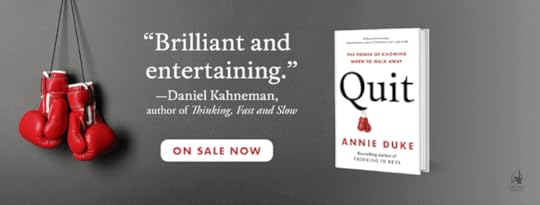
OFFICIAL DESCRIPTION OF THE BOOK:
Business leaders, with millions of dollars down the drain, struggle to abandon a new app or product that just isn’t working. Governments, caught in a hopeless conflict, believe that the next tactic will finally be the one that wins the war. And in our own lives, we persist in relationships or careers that no longer serve us. Why? According to Annie Duke, in the face of tough decisions, we’re terrible quitters. And that is significantly holding us back.
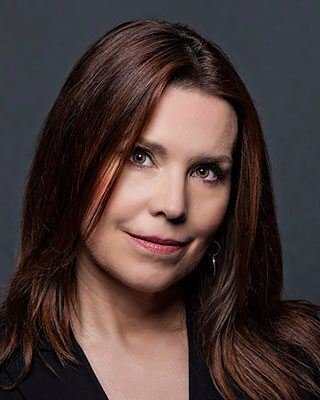 Annie Duke
Annie DukeIn Quit, Duke teaches you how to get good at quitting. Drawing on stories from elite athletes like Mount Everest climbers, founders of leading companies like Stewart Butterfield, the CEO of Slack, and top entertainers like Dave Chappelle, Duke explains why quitting is integral to success, as well as strategies for determining when to hold em, and when to fold em, that will save you time, energy, and money.
You’ll learn:
How the paradox of quitting influences decision making: If you quit on time, you will feel you quit earlyWhat forces work against good quitting behavior, such as escalation commitment, desire for certainty, and status quo biasHow to think in expected value in order to make better decisions, as well as other best practices, such as increasing flexibility in goal-setting, establishing “quitting contracts,” anticipating optionality, and conducting premortems and backcastsWhether you’re facing a make-or-break business decision or life-altering personal choice, mastering the skill of quitting will help you make the best next move.
iTunes – Stitcher – RSS – Patreon – Soundcloud – Simplecast – Spotify – Amazon – Audible
October 2, 2022
YANSS 243 – A tour of the latest, most interesting psychological research with Jay Van Bavel as our guide
In this episode we sit down with NYU psychologist Jay Van Bavel who is very good at Twitter. His feed is always overflowing with the absolute latest and greatest research from psychology with links to papers as they come out – on many of the topics we so often explore on this podcast – and in this episode we discuss ten of those tweets and the research he’s shared.

iTunes – Stitcher – RSS – Spotify – Patreon – Soundcloud – Simplecast
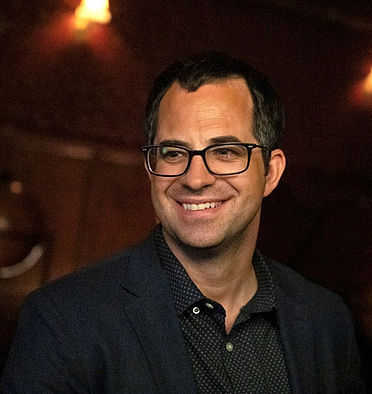 Dr. Jay Van Bavel
Dr. Jay Van BavelDr. Jay Van Bavel is an Associate Professor of Psychology and Neural Science with an affiliation at the Stern School of Business in Management and Organizations at New York University. Prior to coming to NYU, Jay completed his PhD at the University of Toronto. He is the author of “The Power of Us: Harnessing our social identities to improve performance, increase cooperation, and promote social harmony” (with Dominic Packer).
Jay’s is the Director of the NYU Social Identity & Morality Lab and has won several awards for his research on how collective concerns shape the brain and behavior. From neurons to social networks, he has published over 100 academic papers on the psychology and neuroscience of implicit bias, diversity and inclusion, group identity, team performance, cooperation, decision-making, and public health. His research has been cited in the US Supreme Court and Senate, and United Nations.
Jay has written about his research for the public in the BBC, Harvard Business Review, New York Times, Wall Street Journal, Washington Post, and Scientific American. He has appeared on Through the Wormhole (with Morgan Freeman), Why We Hate (by Stephen Spielberg), CBC News, MSNBC, and NBC News, been interviewed on NPR, WNYC, and Bloomberg News, and had his research featured in international media. He also writes a career advice column for Science Magazine.
Jay teaches one the largest courses at NYU and recently received the Golden Dozen Teaching Award. He has given invited talks and keynotes at many of the top psychology departments and business schools (e.g., Stanford, Harvard, Columbia, Oxford), international conferences (e.g., TEDx, World Health Organization, World Science Festival).
TWITTER: @jayvanbavel
I have a new paper explaining how neurons, norms, and institutions shape group #cooperation (with @diegoareinero & @dominicpacker_)
— Jay Van Bavel (@jayvanbavel) April 7, 2022
Our paper presents a framework for understanding why people choose to cooperate or defect https://t.co/u8JDjVhr6U pic.twitter.com/396fgzln6P
80–90% of Americans underestimate the prevalence of support for major #climatechange mitigation policies and climate concern.
— Jay Van Bavel (@jayvanbavel) August 24, 2022
While 66–80% Americans support these policies,
Americans estimate the prevalence to only be between 37–43% on average. https://t.co/n0gRv8i9sM pic.twitter.com/uElRrTzouv
Morality is a key feature of hatred.
— Jay Van Bavel (@jayvanbavel) August 23, 2022
Across 4 studies, our new paper found that hated attitude objects were more connected to core moral beliefs + higher levels of moral emotions (contempt, anger, and disgust) than disliked attitude objects.
See Clara's thread below for details https://t.co/Ne56GdFy6V
People are less willing to engage with others who are they believe hold emotion-based (vs. rational) attitudes. They think these folks will be close minded (ie unlikely to genuinely “hear out” alternative arguments). This stops them from trying to engage. https://t.co/ublzoRIKj2
— Jay Van Bavel (@jayvanbavel) August 21, 2022
A megastudy on a national sample of partisans (n=32,059) tested 25 interventions designed to reduce anti-democratic attitudes & partisan animosity.
— Jay Van Bavel (@jayvanbavel) August 16, 2022
The top 3 were:
-intergroup contact
-addressing mistrust in the media
-creating a common ingroup identityhttps://t.co/YYZ6V579nr pic.twitter.com/FN3UqOcSlS
Jurors regularly vote to convict defendants despite believing in their innocence due to group pressure to achieve a decision and avoid a hung jury https://t.co/hJggMXgPfY
— Jay Van Bavel (@jayvanbavel) August 10, 2022
It's crucial to develop collective decision procedures that don't allow for these sorts of pressures. pic.twitter.com/j9UiRV4AHB
Like-minded groups polarize regardless of whether they are discussing banal matters of fact, matters of personal taste, or questions about value. https://t.co/303ur7BDex
— Jay Van Bavel (@jayvanbavel) August 10, 2022
Social cues can trigger these shifts via signals to group members that some belief is prevalent among them. pic.twitter.com/lacm0yY4vT
People with the strongest opposition to scientific consensus have the lowest levels of objective knowledge–yet they also have the most confidence.
— Jay Van Bavel (@jayvanbavel) August 7, 2022
The people who speak with the most certainly against scientists are the least trustworthy and self-aware :( https://t.co/zifYDuieGk pic.twitter.com/pb69KAsTVX
Our new paper in @PsychScience finds that children of liberal parents engaged in costly third-party punishment against in-group members, whereas children of conservative parents engaged in costly punishment against out-group members.
— Jay Van Bavel (@jayvanbavel) August 4, 2022
A free PDF is here: https://t.co/m9wr9GKk5j https://t.co/Xd6WcghcdX
“One intriguing implication of these findings is that while Americans’ cooperation has increased over time, their beliefs about others’ willingness to cooperate has actually declined,” https://t.co/sWoeXfMTpf via @SciTechDaily1
— Society for Personality and Social Psychology (@SPSPnews) August 31, 2022


Support the show directly by becoming a patron! Get episodes one-day-early and ad-free. Head over to the YANSS Patreon Page for more details.

Links and Sources
iTunes – Stitcher – RSS – Spotify – Patreon – Soundcloud – Simplecast
September 18, 2022
YANSS 242 – The psychology behind the apocalyptic anxieties creating a surge of billionaire preppers
In this episode we sit down with Douglas Rushkoff, a media scholar, journalist, and professor of digital economics who has a new fire in his belly when it comes to the world of billionaire preppers, which comes across in his new book Survival of the Richest: Escape Fantasies of the Tech Billionaires – inspired by his invitation to consult a group of the world’s richest people on how to spend their money now to survive an apocalypse they fear is coming within their lifetimes.
iTunes – Stitcher – RSS – Patreon – Soundcloud – Simplecast – Spotify – Amazon –

OFFICIAL DESCRIPTION OF THE BOOK:
Five mysterious billionaires summoned theorist Douglas Rushkoff to a desert resort for a private talk. The topic? How to survive the “Event”: the societal catastrophe they know is coming. Rushkoff came to understand that these men were under the influence of The Mindset, a Silicon Valley–style certainty that they and their cohort can break the laws of physics, economics, and morality to escape a disaster of their own making—as long as they have enough money and the right technology.
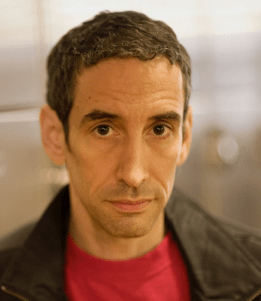 Douglas Rushkoff
Douglas RushkoffIn Survival of the Richest, Rushkoff traces the origins of The Mindset in science and technology through its current expression in missions to Mars, island bunkers, AI futurism, and the metaverse. In a dozen urgent, electrifying chapters, he confronts tech utopianism, the datafication of all human interaction, and the exploitation of that data by corporations. Through fascinating characters—master programmers who want to remake the world from scratch as if redesigning a video game and bankers who return from Burning Man convinced that incentivized capitalism is the solution to environmental disasters—Rushkoff explains why those with the most power to change our current trajectory have no interest in doing so. And he shows how recent forms of anti-mainstream rebellion—QAnon, for example, or meme stocks—reinforce the same destructive order.
Named one of the “world’s ten most influential intellectuals” by MIT, Douglas Rushkoff is a professor of Media Theory and Digital Economics at the City University of New York, he is one of the original cyberpunks, a friend of Timothy Leary’s and a titan of technology journalism who coined the terms viral media, digital native, and social currency. His bestsellers include Coercion, Present Shock, Throwing Rocks and the Google Bus, Program or Be Programmed, Life Inc, and Media Virus, and his famed PBS Frontline documentaries include Generation Like, The Persuaders, and Merchants of Cool. He is also the host of the Team Human podcast.
Links and SourcesiTunes – Stitcher – RSS – Patreon – Soundcloud – Simplecast – Spotify – Amazon –
September 5, 2022
YANSS 241 – The poisonous psychology behind our perpetual drive to pursue respect, adoration, fame, and status
In this episode we welcome back author Will Storr whose new book, The Status Game, feels like required reading for anyone confused, curious, or worried about how politics, cults, conspiracy theories communities, social media, religious fundamentalism, polarization, and extremism are affecting us – everywhere, on and offline, across cultures, and across the world.
What is The Status Game? It’s our primate propensity to perpetually pursue points that will provide a higher level of regard among the people who can (if we provoked such a response) take those points away. And deeper still, it’s the propensity to, once we find a group of people who regularly give us those points, care about what they think more than just about anything else.
In the interview, we discuss our inescapable obsession with reputation and why we are deeply motivated to avoid losing this game through the fear of shame, ostracism, embarrassment, and humiliation while also deeply motivated to win this game by earning what will provide pride, fame, adoration, respect, and status.
iTunes – Stitcher – RSS – Patreon – Soundcloud – Omny – Spotify – Amazon – Audible
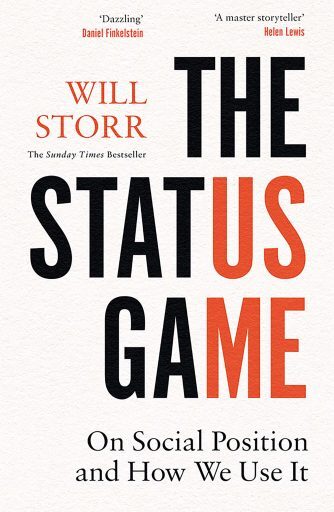
OFFICIAL DESCRIPTION OF THE BOOK
For centuries, philosophers and scholars have described human behaviour in terms of sex, power and money. In The Status Game, bestselling author Will Storr radically turns this thinking on its head by arguing that it is our irrepressible craving for status that ultimately defines who we are.
From the era of the hunter-gatherer to today, when we exist as workers in the globalised economy and citizens of online worlds, the need for status has always been wired into us. A wealth of research shows that how much of it we possess dramatically affects not only our happiness and wellbeing but also our physical health – and without sufficient status, we become more ill, and live shorter lives. It’s an unconscious obsession that drives the best and worst of us: our innovation, arts and civilisation as well as our murders, wars and genocides. But why is status such an all-consuming prize? What happens if it’s taken away from us? And how can our unquenchable thirst for it explain cults, moral panics, conspiracy theories, the rise of social media and the ‘culture wars’ of today?
On a breathtaking journey through time and culture, The Status Game offers a sweeping rethink of human psychology that will change how you see others – and how you see yourself.
 Will Storr
Will StorrWill Storr is an award-winning writer. He’s the author of six critically acclaimed books, including the novel The Hunger and The Howling of Killian Lone and the Sunday Times bestseller The Science of Storytelling. His journalism has appeared in titles such as The Guardian, The Sunday Times, The New Yorker and The New York Times. His prizes include a National Press Club award for excellence and the AFM award for Best Investigative Journalism. His work on sexual violence against men earned the Amnesty International Award and a One World Press Award. He’s also been presented with the AIB Award for Best Investigative Documentary for his BBC radio series.
He teaches popular storytelling classes in London and has been invited to present his Science of Storytelling workshop all over the world. He’s an in-demand ghostwriter whose books have spent months at the top of the Sunday Times bestseller chart and have sold more than two million copies.
Links and SourcesiTunes – Stitcher – RSS – Patreon – Soundcloud – Omny – Spotify – Amazon
August 22, 2022
YANSS 240 – What leads people into specific conspiracy theory communities, and why are they so alluring?
Transcript  â iTunes â Stitcher â RSS â Soundcloud â Omny â Spotify – Amazon – – Apple
When we talk about conspiracy theories, we tend to focus on what people believe instead of why, and, more importantly, why they believe those things and not other things. In this episode, we sit down with two psychologists working to change that, and in addition, change the term itself from conspiracy theory to conspiracy narrative, which more accurately describes what makes any one conspiracy appealing enough to form a community around it and in rare cases result in collective action.

Joseph Uscinski is an associate professor of political science at the University of Miami. He studies public opinion and mass media, with a focus on conspiracy theories and related misinformation. His recent article for The Guardian argues that QAnon is not growing, nor is is a right-wing conspiracy theory. He is the coauthor of American Conspiracy Theories and editor of Conspiracy Theories and the People Who Believe Them.

Anni Sternisko is a doctoral candidate at New York University studying conspiracy theory beliefs, social identity and moral judgment. Her recent paper titled: The dark side of social movements: Social identity, non-conformity, and the lure of conspiracy theories, opens with, “Research has linked conspiracy theory beliefs to anti-democratic attitudes, prejudice and non-normative political behavior. We propose a framework to understand the motivational processes behind conspiracy theories and associated social identities and collective action.”
Links and Sources
Transcript  â iTunes â Stitcher â RSS â Soundcloud â Omny â Spotify – Amazon – – Apple
Who Supports QAnon? A Case Study in Political Extremism
QAnon and sex trafficking beliefs
QAnon: a timeline of violence linked to the conspiracy theory
‘Pizzagate’ conspiracy theorist gets four years in prison
Iâm a Parkland Shooting Survivor. QAnon Convinced My Dad It Was All a Hoax.
CSIS Threat Assessment of QAnon
Frontline: The United States of Conspiracy
Man pleads guilty to terrorism after Hoover Dam barricade
The Atlantic: The Prophecies of Q
The Jan. 6 Insurrectionists Arenât Who You Think They Are
The Skeptic’s Guide to the Universe
The United States of Paranoia: A Conspiracy Theory
The Study of Conspiracy Theories
Conspiracy Theories Canât Be Stopped
Meta-Analysis of Psychological Research on Conspiracy Beliefs
August 8, 2022
YANSS 239 – Jon Levy on how to build your own true, real-world social network of genuine trust and mutually beneficial influence
Our guest in this episode is the behavioral scientist Jon Levy, who wrote a book titled Youâre Invited: The Art and Science of Cultivating Influence which details how Jon had no money, reputation or state-us, but was still able to convince groups of Nobel Laureates, Olympians, celebrities, Fortune 500 executives, and even a princess to not only give him advice, but cook him dinner, wash his dishes, sweep his floors, and then thank him for the experience.
iTunes â Stitcher â RSS â Patreon â Soundcloud – Omny – Spotify – Amazon – Audible
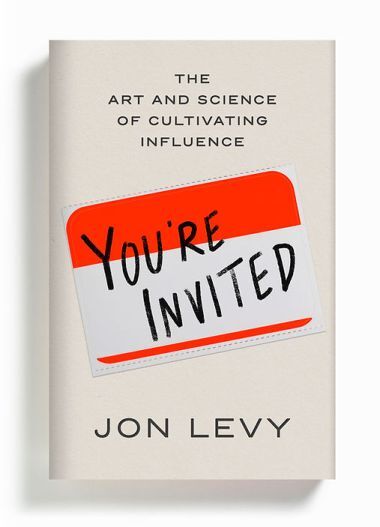
OFFICIAL DESCRIPTION OF THE BOOK
The Art and Science of Cultivating Influence
Regardless of what we want to accomplish, from growing your business, creating a great company culture, championing a social cause, or affecting your habits, we canât do it alone. The people around you define your success (whatever that means for you) and they have the potential to change the course of your life.
Thatâs what Youâre Invited is about: The most universal strategy for success is creating meaningful connections with those who can impact you, your life, and the things you care about. But how do you make those connections and build trust quickly? What do you do if youâre introverted or hate networking?
Behavioral scientist Jon Levy had no money, reputation or status, but was able to convince groups of Nobel Laureates, Olympians, celebrities, Fortune 500 executives, and even an occasional princess to not only give him advice, but cook him dinner, wash his dishes, sweep his floors, and then thank him for the experience. The goal of his gatherings, much like this book, was not networking, but to build meaningful and lasting relationships.
This private community became known as âThe Influencersâ, named for the memberâs success and industry influence. Since its inception more than a decade ago, The Influencers has grown into the largest private group of its kind worldwide, with a thriving community both in person and through digital experiences.
In Youâre Invited, Levy guides readers through the art and science of creating deep and meaningful connections with anyone, regardless of their stature or celebrity, and demonstrates how we develop influence, gain trust, and build community so that we can achieve whatâs important to us.
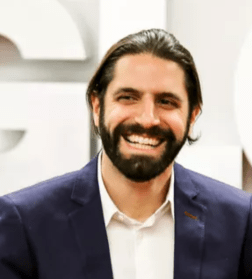 Jon Levy
Jon LevyJon Levy is a behavioral scientist and New York Times Best Selling author known for his work in trust, human connection, belonging, and influence. Jon specializes in applying the latest research to transform the ways companies approach marketing, sales, consumer engagement, and culture. His clients range from Fortune 500 brands, like Microsoft, Google, AB-InBev, and Samsung, to startups.
More than a decade ago, Jon founded The Influencers Dinner, a secret dining experience for industry leaders ranging from Nobel laureates, Olympians, celebrities, and executives, to artists, musicians, and even the Grammy winning voice of the bark from âWho Let the Dogs Out.â Guests cook dinner together, but canât discuss their career or give their last name, and once seated to eat, they reveal who they are. Over time, these dinners developed into a community. With thousands of members, Influencers is the largest community of its type worldwide.
Jonâs second book, Youâre Invited: The Art and Science of Cultivating Influence, was released in 2021 to incredible fanfare quickly becoming a New York Times Best Seller, and was selected by the Wall Street Journal as a “Book of the Month”. In it, he demonstrates the importance of human connection, trust and community to accomplishing what is most important to us.
In his free time, Jon works on outrageous projects. Among them spending a year traveling to all 7 continents, or to the world’s greatest events (Grand Prix, Art Basel, Burning Man, Running of the Bulls, etc.) and barely surviving to tell the tale. These Adventures were chronicled in his first book: The 2 AM Principle: Discover the Science of Adventure
Links and SourcesiTunes â Stitcher â RSS â Patreon â Soundcloud – Omny – Spotify – Amazon – Audible
July 24, 2022
YANSS 238 – Jennifer Shahade on how we can learn about passion, obsession, representation, sexism, strategy, tactics, and sideways thinking by exploring the world of professional chess players
In this episode we sit down with Jennifer Shahade, a two-time U.S. Womenâs Chess Champion, author, speaker, and professional poker player whose new book, Chess Queens, is the true story of the greatest female players of all time interwoven with her own experiences as a chess champion.
iTunes â Stitcher â RSS â Patreon â Soundcloud – Omny – Spotify – Amazon – Audible
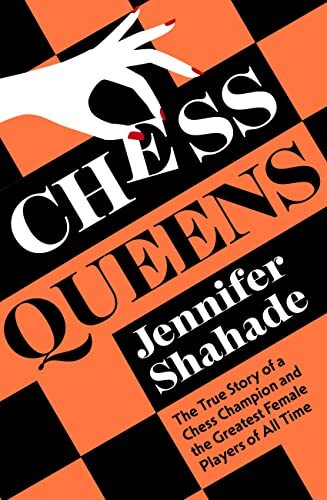
OFFICIAL DESCRIPTION OF THE BOOK
For fans of The Queenâs Gambit, this is the real life story of a female chess champion travelling the world to compete in a male-dominated sport with the most famous players of all time.
Jennifer Shahade, a two-time US Womenâs Chess Champion, spent her teens and twenties travelling the world playing chess. Tournaments have taken her from Istanbul to Moscow, and introduced her to players from Zambia to China. In this ultra male-dominated sport, Jennifer found shocking sexism, as well as an incredible history of the top female players that has often been ignored. But she also found friendships, feminism and hope.
Through her own story as well as in-depth profiles of pioneers of the game , Jennifer invites us into the extremely competitive world of chess. She shows us the rivalry and the camaraderie; the ecstatic highs and the excruciating losses; the glamour and the hard work. She describes the coach who told her that her period will affect her standard of play, and gives us thrilling blow by blow accounts of the matches that made history.
Intertwined with Jenniferâs own story are those of the top female players from around the world. We meet the famous Polgar sisters, the three Hungarian girls who were all child prodigies; we meet the glamorous jet setters who travel the world partying, and the players who escaped war-torn countries to become champions against the odds.
Chess Queens is a fascinating glimpse into the exhilarating world of chess and an essential book for all the aspiring chess queens of today.
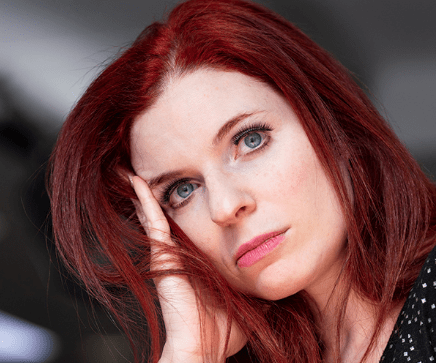 Jennifer Shahade
Jennifer ShahadeJennifer Shahade grew up in a family of gamers.
Her brother is IM Greg Shahade is founder of the PRO Chess League and the US Chess School, while her mother, Dr. Sally Solomon (1940-2013), was an avid bridge and poker player. Her father, FM Michael Shahade is a four-time state champion and taught her chess at five. Jennifer did not take to the game right away, gravitating instead to acting and writing. When she got back into it in high school, she fell in love and quickly improved, becoming a National Master at the age of 16, and the first female to win the US Junior Open. She went on to win two US Chess Womenâs Championship titles and a Silver Olympic medal.
Jenniferâs joint passion for games and art led to dozens of creative projects through her career, including authoring Chess Queens, which chronicles the true stories of the top women players in history, intertwined with Jenniferâs own life. Sheâs also the host of two award-winning podcasts, the GRID and Ladies Knight. The show is a game within a game, as Jen fills out the entire 169 grid of possible poker hands, with no repeats.
Jennifer is the MindSports Ambassador at PokerStars and loves to show how games like poker and chess can help anyone make better decisions. Her titles include a Championship belt at the Open Face High Roller Championship in Prague. Jennifer fights to make games more inclusive through her work with US Chess Women, where she helps bring chess to girls, gender minorities and women. Sheâs also an ambassador for Poker Power, an organization that aims to âflip the tableâ and teach one million women poker.
Links and SourcesiTunes â Stitcher â RSS â Patreon â Soundcloud – Omny – Spotify – Amazon – Audible
YANSS 228 – Jennifer Shahade on how we can learn about passion, obsession, representation, sexism, strategy, tactics, and sideways thinking by exploring the world of professional chess players
In this episode we sit down with Jennifer Shahade, a two-time U.S. Womenâs Chess Champion, author, speaker, and professional poker player whose new book, Chess Queens, is the true story of the greatest female players of all time interwoven with her own experiences as a chess champion.
iTunes â Stitcher â RSS â Patreon â Soundcloud – Omny – Spotify – Amazon – Audible

OFFICIAL DESCRIPTION OF THE BOOK
For fans of The Queenâs Gambit, this is the real life story of a female chess champion travelling the world to compete in a male-dominated sport with the most famous players of all time.
Jennifer Shahade, a two-time US Womenâs Chess Champion, spent her teens and twenties travelling the world playing chess. Tournaments have taken her from Istanbul to Moscow, and introduced her to players from Zambia to China. In this ultra male-dominated sport, Jennifer found shocking sexism, as well as an incredible history of the top female players that has often been ignored. But she also found friendships, feminism and hope.
Through her own story as well as in-depth profiles of pioneers of the game , Jennifer invites us into the extremely competitive world of chess. She shows us the rivalry and the camaraderie; the ecstatic highs and the excruciating losses; the glamour and the hard work. She describes the coach who told her that her period will affect her standard of play, and gives us thrilling blow by blow accounts of the matches that made history.
Intertwined with Jenniferâs own story are those of the top female players from around the world. We meet the famous Polgar sisters, the three Hungarian girls who were all child prodigies; we meet the glamorous jet setters who travel the world partying, and the players who escaped war-torn countries to become champions against the odds.
Chess Queens is a fascinating glimpse into the exhilarating world of chess and an essential book for all the aspiring chess queens of today.
 Jennifer Shahade
Jennifer ShahadeJennifer Shahade grew up in a family of gamers.
Her brother is IM Greg Shahade is founder of the PRO Chess League and the US Chess School, while her mother, Dr. Sally Solomon (1940-2013), was an avid bridge and poker player. Her father, FM Michael Shahade is a four-time state champion and taught her chess at five. Jennifer did not take to the game right away, gravitating instead to acting and writing. When she got back into it in high school, she fell in love and quickly improved, becoming a National Master at the age of 16, and the first female to win the US Junior Open. She went on to win two US Chess Womenâs Championship titles and a Silver Olympic medal.
Jenniferâs joint passion for games and art led to dozens of creative projects through her career, including authoring Chess Queens, which chronicles the true stories of the top women players in history, intertwined with Jenniferâs own life. Sheâs also the host of two award-winning podcasts, the GRID and Ladies Knight. The show is a game within a game, as Jen fills out the entire 169 grid of possible poker hands, with no repeats.
Jennifer is the MindSports Ambassador at PokerStars and loves to show how games like poker and chess can help anyone make better decisions. Her titles include a Championship belt at the Open Face High Roller Championship in Prague. Jennifer fights to make games more inclusive through her work with US Chess Women, where she helps bring chess to girls, gender minorities and women. Sheâs also an ambassador for Poker Power, an organization that aims to âflip the tableâ and teach one million women poker.
Links and SourcesiTunes â Stitcher â RSS â Patreon â Soundcloud – Omny – Spotify – Amazon – Audible
July 10, 2022
YANSS 237 – How to bridge divides on wedge issues by revealing shared values and avoiding reactance
New research suggests people on opposite sides of wedge issues want to listen to each other. We are each eager to hear differing opinions and understand opposing views, and when we do it can change our minds (at least a little), but only when we aren’t triggered by the psychological phenomenon of reactance – one of several ideas we explore in this episode.

Download â iTunes â Stitcher â RSS â Spotify â Patreon â  Soundcloud â Omny â Amazon â Audible
In this episode, we are joined by Cornell economist Michèle Belot who walks us through her new paper, coauthored with Guglielmo Briscese at the University of Chicago, titled Bridging Americaâs Divide on Abortion, Guns and Immigration: An Experimental Study.
You’ll hear all about the contact hypothesis, the minimal group paradigm, and reactance as we get into the major finding of the paper summed up here in the abstract:
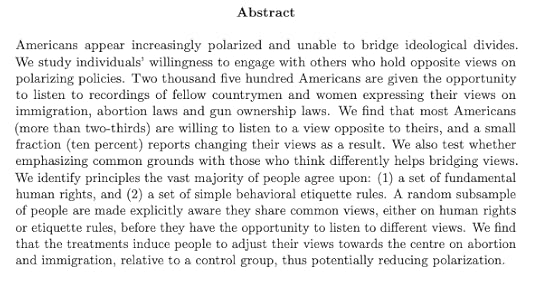
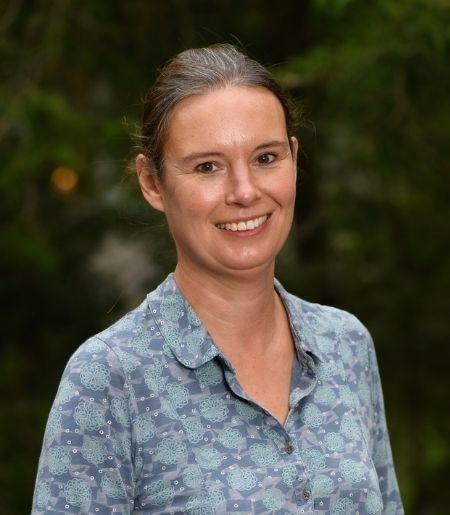 Dr. Michèle Belot
Dr. Michèle BelotFrom Michèle Belot’s official bio:
“Michèle Belot is Professor of Economics at the Department of Economics and at the School of Industrial Labor Relations.
She held previous appointments in the United Kingdom (University of Edinburgh, Oxford University and the University of Essex) and at the European University Institute. She obtained her Ph.D. in Economics from Tilburg University (CentER) in 2003.
Her research interests are broadly in applied microeconomics, with a special interest in experimental work in areas related to labour, health and education. She has published in journals such as the Review of Economic Studies, the Review of Economics and Statistics, the Journal of Health Economics, Proceedings of the National Academy of Science and The Economic Journal. She is the current President of the European Association of Labour Economists.
Her recent work consists of designing and testing interventions using randomized controlled trials, in the domains of health and job search. In the domain of health, her work focuses on interventions designed to encourage individuals to adopt healthier behaviors. Most interventions tested target children and low income families. In the domain of job search, the interventions are aimed at providing relevant information to job seekers.”
Subscribe to the newsletter

Support the show directly by becoming a patron! Get episodes one-day-early and ad-free. Head over to the YANSS Patreon Page for more details.

Links and Sources
Download â iTunes â Stitcher â RSS â Spotify â Patreon â Soundcloud â Omny – Amazon – Audible
Bridging Americaâs Divide on Abortion, Guns and Immigration:
An Experimental Study
Newsletter
June 27, 2022
YANSS 236 – How Minds Change
In this episode I read an excerpt from my new book How Minds Change detailing the time I spent with canvassers in Los Angeles who went door to door testing different ways to change minds among those opposed to abortion rights, and Chris Clearfield interviews me about that very same book – which is out now and available everywhere.
You can read a sample chapter at this link, and you can subscribe to the new newsletter at this one.
Download â iTunes â Stitcher â RSS â Patreon â Soundcloud – Omny – Spotify – Amazon – Audible

A brain-bending investigation of why some people never change their mindsâand others do in an instantâby the bestselling author of You Are Not So Smart
What made a prominent conspiracy-theorist YouTuber finally see that 9/11 was not a hoax? How do voter opinions shift from neutral to resolute? Can widespread social change only take place when a generation dies out? From one of our greatest thinkers on reasoning, HOW MINDS CHANGE is a book about the science, and the experience, of transformation.
When self-delusion expert and psychology nerd David McRaney began a book about how to change someone’s mind in one conversation, he never expected to change his own. But then a diehard 9/11 Truther’s conversion blew up his theoriesâinspiring him to ask not just how to persuade, but why we believe, from the eye of the beholder.
Delving into the latest research of psychologists and neuroscientists, HOW MINDS CHANGE explores the limits of reasoning, the power of groupthink, and the effects of deep canvassing.
Told with McRaney’s trademark sense of humor, compassion, and scientific curiosity, it’s an eye-opening journey among cult members, conspiracy theorists, and political activists, from Westboro Baptist Church picketers to LGBTQ campaigners in California â that ultimately challenges us to question our own motives and beliefs. In an age of dangerous conspiratorial thinking, can we rise to the occasion with empathy?
An expansive, big-hearted journalistic narrative, HOW MINDS CHANGE reaches surprising and thought-provoking conclusions, to demonstrate the rare but transformative circumstances under which minds can change.
Bite size book reading: pic.twitter.com/F7QQff4X5y
— David McRaney (@davidmcraney) June 21, 2022
ADVANCED PRAISE FOR HOW MINDS CHANGE
“If you join David McRaney on this journey â a spirited tour that ranges from activists to scientists to cultists â youâll arrive in an unexpected place. He shows us how generous conversations can replace zero-sum debates and how genuine empathy can close deep divisions. HOW MINDS CHANGE is the ideal book for our perilous moment.â – Daniel H. Pink, #1 New York Times bestselling author of The Power of Regret, To Sell is Human, and Drive
âââ
“A riveting read on the art and science of persuasion. David McRaney’s brilliant book will force you to rethink your views about how to motivate other people to rethink theirs. In a time when too many minds seem closed, this is a masterful analysis of what it takes to open them.” – Adam Grant, #1 New York Times bestselling author of Think Again and host of the podcast WorkLife
âââ
“Filled with the kinds of captivating real-life stories that you can’t wait to tell your friends and the latest scientific insights from psychology and beyond, McRaney’s book provides a surprising glimpse into why changing human minds is so damn hard… but also the good news that it can in fact be possible with the right strategies.” – Laurie Santos, Professor of Psychology at Yale University and host of The Happiness Lab podcast
âââ
âWhen I first talked to David McRaney about How Minds Change, I found myself taking mad notes on everything he was explaining to me! Thank goodness he wrote the book so I can relax and just soak it all in!â – Simon Sinek, New York Times bestselling author of Start with Why and The Infinite Game
âââ
âA timely, informative, and encouraging case for why the craziness paralyzing our society may not be permanent, and a refreshingly actionable proposal for changing ourselves, among others.â – Douglas Rushkoff, bestselling author of Team Human, Present Shock, and Coercion
âââ
âDavid McRaney is one of our finest science communicators and How Minds Change is his greatest achievement yet. Brilliantly smart, continually entertaining and utterly timely, it will change the way you see the world – and help you change others.â – Will Storr, author of Selfie, The Science of Storytelling, The Status Game, and The Unpersuadables
âââ
“McRaney’s the best science writer I know at this complex, fascinating subject — the fabric of our thought and beliefs. ‘How Minds Change’ is a page-turner, filled with remarkable reporting and stories.” – Clive Thompson, author of Coders: The Making of A New Tribe and the Remaking of the World
âââ
âMcRaney’s topic in How Minds Change couldn’t be more important, and he’s the perfect guide to it: warm, witty, and powered by an infectious curiosity.â – Julia Galef, host of the Rationally Speaking podcast and author of The Scout Mindset
âââ
âDavid McRaney changed my mind about changing minds. If you want to be a better thinker and citizen and arenât ready to give up on the world, this book is a must-read.â – A. J. Jacobs, New York Times bestselling author of The Year of Living Biblically
âââ
âThis book is a fascinating journey through the neuroscience and psychology of how we form and update our opinions. How Minds Change is the book our society desperately needs right now.â – Scott Barry Kaufman, founder of the Center for the Science of Human Potential and author of Transcend
âââ
âHOW MINDS CHANGE brings us face to face with the radically weird science of how our thoughts, perceptions, and beliefs are actually formed, and how they can, for better or worse, be modified. The sensation this book creates of being a bit of a stranger to oneâs own mind is not entirely comfortable, but it is surely worthwhile.â – Jordan Ellenberg, New York Times bestselling author of Shape and How Not to Be Wrong
âââ
âRead this book cover to cover–it will change how you feel about tackling one of the most difficult relationship challenges: Changing the minds of the people we care about, without damaging the relationship itself.â – Tessa West, NYU psychology professor and author of Jerks at Work
âââ
“There is perhaps no greater nut to crack than how we can more easily change minds, including our own, in the face of compelling evidence. David McRaney has turned his attention to this important problem in recent years and shares the surprising nature of why minds do and do not change. In these contentious times, it’s heartening to have David’s book on hand — to teach us about burgeoning research into effectively changing minds and how it might be more achievable in certain contexts than we might think.” – Maya Shankar, former Chair of the White House Behavioral Science Team and Behavioral Science Advisor to the United Nations, host of the podcast, A Slight Change of Plans.
âââ
“One of the most powerful traits of humanity is our capacity to not only update our own beliefs, but also change the minds of others. David McRaney provides a tour de force on how we can persuade others without relying on coercion.” – Jay Van Bavel, director of the NYU Social Identity & Morality Lab and author of The Power of Us
âââ
âIn an era where people feel separated by polarization and tribalism, David goes beyond simple academic concepts and provides concrete strategies to create meaningful conversations that can shift perspectives and connect people.â – Jon Levy, NYT bestselling author of Youâre Invited
âââ
“This is a must-read manual for anyone interested in the seemingly impossible task of changing peopleâs minds. Discover the science behind how we form beliefs, attitudes, and values, and the surprisingly simple way our views can shift.” – Logan Ury, author of How To Not Die Alone
âââ
“David McRaney, more than just about anybody, has devoted his life to exploring the surprising tricks that our minds play on us. He is a master of using fascinating stories to teach us important principles of psychology. While David’s previous work focused on how reasoning and decision-making so often go wrong and how we manage to convince ourselves we’re right, now he is tackling the other side of the coin: how it is that we sometimes dramatically change our minds.” – Spencer Greenberg, host of the Clearer Thinking podcast and CEO of Spark Wave.
â â â
âThat very rare thing – an astonishingly interesting book on a vitally important topic.â – Rory Sutherland, vice chairman at Ogilvy UK and author of Alchemy: The Surprising Power Of Ideas That Don’t Make Sense
âââ
âA combination of compelling overview and practical strategy. Benjamin Franklin wrote that public libraries would empower the common man by giving him knowledge. Free public education, a 19th-century invention, proclaimed the same goal. In the following century, computers and, later, the internet would spread information everywhere, overwhelming the forces of censorship, propaganda, prejudice, and lies. As we all know, the opposite happened. This spread of misinformation has produced countless books about true believers who are impervious to evidenceâcontradictory facts actually strengthen their beliefs. In one of his examples, McRaney, author of You Are Not So Smart, examines attitudes toward same-sex marriage. At the turn of the 21st century, opposition was overwhelming; by the teens, it was crumbling; today, itâs gained fairly wide acceptance. What happened? Searching to discover why fiercely prejudiced people changed their minds, the author begins with the mind itself. Evolution designed the brain for survival, not accuracy. Making decisions from the raw data of our senses is hopelessly slow. Brains work fast and take shortcuts, so we see what we expect to see. When we encounter something that doesnât make sense, our instinct is not to question our beliefs but to make it fitâand we almost always succeed. Only when contradictions pile up do individuals, reluctantly, reconsider. Equally important, humans are ultrasocial animals who value being accepted by their communities more than being right. Sociologist Brooke Harrington told McRaney, âSocial death is more frightening than physical death.â After investigating the stories of true believers who saw the light, the author concludes by describing successful methods. With labels like âstreet epistemologyâ or âdeep canvassing,â they involve building rapport; listening respectfully to a claim, however wacky; exploring the reasons behind it; and encouraging believers to judge the quality of their reasons. The goal is getting people to think about their own thinking. It doesnât always work, but McRaney effectively shows how it has proven far more successful than focusing on facts. Convincing advice regarding a timely issue.â
âââ
âWhat does the phrase âchange your mindâ even mean?â asks journalist McRaney (You Are Not So Smart) in this fascinating take. To investigate how peopleâs opinions can be changed, he speaks with a former â9/11 trutherâ who was a âleader in the… communityâ before having a change of heart; interviews psychologists who suggest that when trying to persuade someone, a âmessage canât seem threatening to a personâs group identity, or the central route will remain barricadedâ; and spends time with gay rights activists who use a method called âdeep canvassing,â which involves sharing oneâs own story and ânon-judgmental listeningâ to win people over, because âthe only way they are going to change their mind,â the rationale goes, âis by changing their own mind.â The authorâs approach to persuasion calls for compassion: âWhen interacting with someone who is vaccine-hesitant, youâll get much further if you frame it as respectful collaboration toward a shared goal, based on mutual fears and anxieties, and demonstrate you are open to their perspective and input.â McRaney makes a convincing case that âwe must avoid debate and start having conversationsâ and backs it up with what science has to say about âreplac[ing] old ignorance with new wisdom.â The result is an eye-opening survey filled with heart.â
âââ
âThis book is bad news for anyone who thinks we should use facts and evidence to change peopleâs minds. It is disappointing for lovers of debate. It reveals the psychological and evolutionary reasons why all humans are certain we are right, and why âcertaintyâ is nothing but an illusion. But itâs an optimistic, illuminating and even inspiring read. Because while you canât talk someone into changing their mind, you just might be able to listen them into it, and David McRaney thinks he can show you howâ¦The book is a rousing call to action, an explanation of how societies change their minds in a sudden cascade on subjects such as equal marriage. McRaney talks of generations of campaigners, each hammering away at a crack in the status quo, passing on their hammers to the people after them. The key, he says, âis to never put that hammer downâ. But McRaney is also inspiring in his quieter revelations. He points out: âThe only way to win a debate is to avoid changing oneâs own mind. Only the âloserâ of a debate learns anything new, and no one wants to be a loser.â It encourages those of us who think that weâre right to think again, and to listen. As a believer in facts and evidence, a wielder of hammers and a haver of debates, I thought that winning these battles was always the most important thing. I might just have changed my mind.â
Download â iTunes â Stitcher â RSS â Patreon â Soundcloud – Omny – Spotify – Amazon – Audible
Link to learn more about the book: www.davidmcraney.com/howmindschangehomeLink to learn more about Deep Canvassing: www.newconvo.orgLink to my new newsletter: davidmcraney.substack.com/subscribeLink to Chris Clearfieldâs handout: www.chrisclearfield.com/changePrevious EpisodesDavid McRaney's Blog
- David McRaney's profile
- 582 followers



